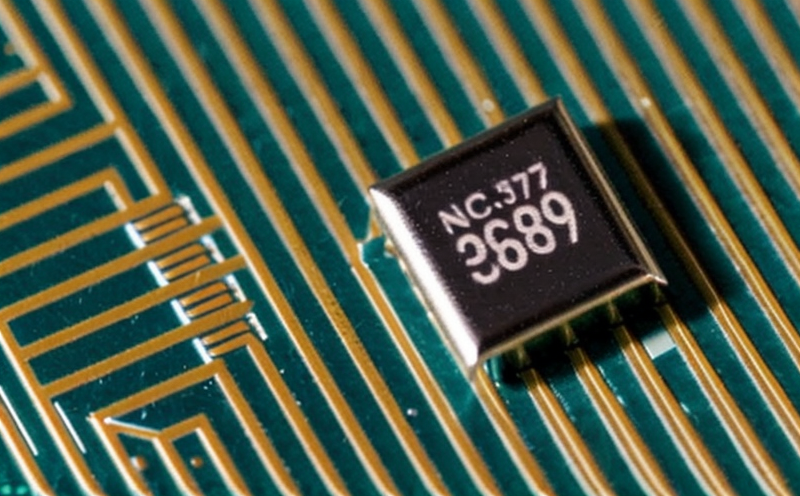ASTM F1384 Semiconductor Reliability Defect Testing
The ASTM F1384 standard is a critical benchmark in semiconductor reliability testing. This method evaluates microchip defects and their impact on long-term performance, ensuring that the devices meet stringent quality standards before they enter manufacturing processes or are deployed into end products.
ASTM F1384 involves a series of tests designed to simulate real-world conditions that may affect semiconductor integrity over extended periods. The testing process includes electrical stress and thermal cycling, which help identify potential defects such as solder joint failures, die attach issues, and other reliability concerns. These tests are essential for ensuring the longevity and performance consistency of microchips in various applications.
The ASTM F1384 test procedure is particularly useful for quality managers and compliance officers seeking to ensure that their semiconductor products meet international standards. By adhering to this standard, manufacturers can enhance product reliability, reduce warranty costs, and improve overall customer satisfaction. The testing process typically involves the following steps:
- Sample preparation
- Electrical stress application
- Thermal cycling simulation
- Data collection and analysis
- Reporting of results
The ASTM F1384 standard is widely recognized for its comprehensive approach to semiconductor reliability testing. It is part of a broader suite of standards that form the backbone of quality assurance in the electronics industry. Compliance with this standard ensures that products meet international benchmarks, which can significantly enhance market credibility and customer trust.
The ASTM F1384 test method is particularly valuable for R&D engineers looking to innovate within the semiconductor sector. By understanding the specific parameters outlined in this standard, engineers can design more reliable chips from the outset. This approach not only saves time and resources but also ensures that products are ready for market at a higher quality level.
For procurement professionals, ASTM F1384 offers a means to verify supplier compliance with industry standards. By insisting on suppliers who adhere to this standard, companies can ensure they are sourcing components from reputable manufacturers who prioritize reliability and quality.
Why It Matters
The importance of ASTM F1384 cannot be overstated in the semiconductor industry. Microchips form the backbone of modern electronics, and their reliability is critical to the functioning of devices ranging from smartphones to automotive systems. Defects in these chips can lead to failures that result in product recalls, increased warranty costs, and damage to brand reputation.
ASTM F1384 provides a structured approach to identifying potential defects before they become critical issues during production or use. By using this standard, manufacturers can ensure that their products meet the highest quality standards, thereby reducing the risk of failures in the field. This is particularly important given the increasing complexity and miniaturization of semiconductor devices.
The testing process outlined in ASTM F1384 helps to identify defects early in the manufacturing cycle. Early detection allows for corrective actions to be taken before significant costs are incurred or products reach end users. This not only enhances product quality but also contributes to a more sustainable supply chain by minimizing waste and rework.
The standard's emphasis on reliability testing is especially pertinent given the growing demand for long-lasting, high-performance electronics. As technology continues to evolve, the need for robust semiconductor devices that can withstand harsh operating conditions becomes increasingly important. ASTM F1384 plays a crucial role in ensuring that these devices meet the necessary durability and performance criteria.
Furthermore, compliance with ASTM F1384 is essential for meeting regulatory requirements and industry standards. Many countries have stringent regulations governing the quality of electronic components, and adhering to international standards like ASTM ensures compliance with these regulations. This can help businesses avoid legal issues and maintain a positive market reputation.
Environmental and Sustainability Contributions
The ASTM F1384 testing process helps identify defects early in the manufacturing cycle, reducing the need for post-production repairs or recalls. This minimizes waste and conserves resources, contributing to a more sustainable supply chain.
By ensuring that semiconductor devices meet stringent quality standards, ASTM F1384 helps extend product lifecycles. Longer-lasting products reduce electronic waste and contribute to environmental sustainability.
The standard's emphasis on reliability testing can lead to innovations in design and manufacturing processes that further enhance the efficiency of semiconductor production, reducing energy consumption and carbon footprints.
Competitive Advantage and Market Impact
Adhering to ASTM F1384 provides significant competitive advantages for semiconductor manufacturers. By ensuring product reliability and quality, companies can differentiate themselves in the market by offering products that are less prone to failure. This can lead to higher customer satisfaction and loyalty, as well as reduced warranty costs.
The standard's reputation within the industry also enhances a company's credibility and trustworthiness. Compliance with international standards like ASTM F1384 is often seen as a mark of quality assurance, which can attract customers who prioritize reliability in their product choices.
Moreover, adhering to this standard can open up opportunities for collaboration and partnerships within the industry. Companies that demonstrate their commitment to quality through compliance with ASTM F1384 are more likely to be approached by other reputable firms seeking reliable suppliers or partners.
The market impact of ASTM F1384 is significant in terms of setting a benchmark for semiconductor reliability testing. By ensuring that all products meet the same high standards, this standard helps to maintain industry integrity and promotes fair competition. This can lead to advancements in technology as companies strive to outperform one another by innovating within the constraints set by ASTM F1384.





